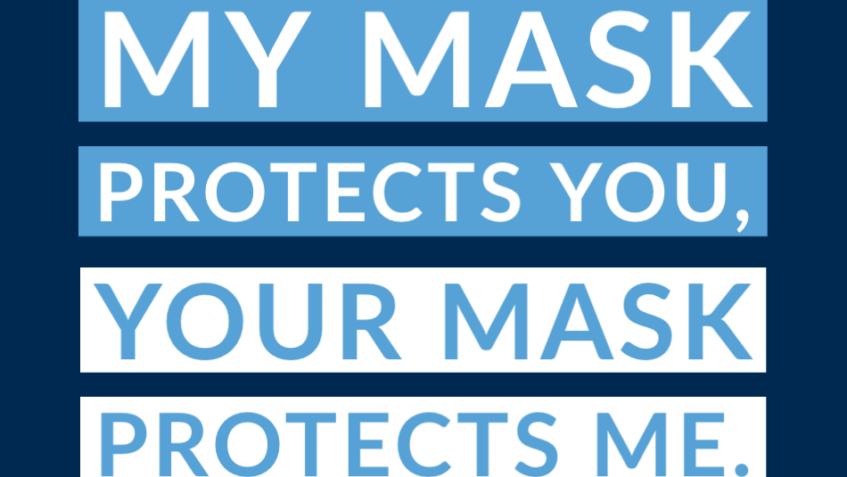Dear neighbors,
I hope this message finds you and your loved ones healthy and safe. As the state starts to consider the transition to reopening, please remember that in order to avoid another spike in infection rates, we have to stay the course by staying home to stay healthy.

The scientific data tells us if we were to lift all restrictions right now or even two weeks from now, the decline in cases would almost certainly stop and the spread of COVID-19 would increase. That would set everything back, which would bring more illnesses and more deaths, and businesses would remain closed for even longer.
King County residents have been directed to wear face coverings in most public settings beginning May 18. As a community, it’s our job to work together to stop the spread of COVID-19. Even if you have no symptoms, you may still be a carrier of the virus who could spread it to others.
Starting now, show the people in your community that their health matters to you, even if you are not concerned for your own. Do others the courtesy of wearing a mask to protect them and their families.
Learn more about the King County directive here.
Paying Rent in Times of COVID-19
Pay your rent if you can. Here’s why:
#1 The eviction moratorium does not forgive rent amounts you owe. Paying rent will help you avoid eviction after the moratorium is lifted.
#2 Tenants who keep paying rent free up resources for landlords to give a break to neighbors who can’t pay due to income loss.
#3 Willful failure to pay could end up getting you evicted later, which will limit your ability to rent a home in the future.
#4 Eviction courts are unlikely to give you a break if you had the ability to pay rent and did not.
#5 Smaller landlords are also struggling during this time, and if they are forced to sell their properties because they’re not receiving rent, even more of the rental market could end up dominated by large corporate landlords.
#6 Landlords have costs to keep properties open, healthy and safe, including:
-
- Utilities
- Repairs
- Staff
- Insurance
- Mortgages
- Property taxes
If you can’t pay your rent:
Reach out to your landlord or property manager. In writing, explain your situation and request an accommodation. Here are some ideas:
- Ask for a waiver of rent for a certain amount of time.
- Propose a partial payment.
- Ask to apply whatever deposits you have on file to the missed rent.
- Request a payment plan for missed rent.
And remember:
- Keep copies of all communications between you and your landlord.
- Make sure any agreement you reach with your landlord is in writing.
- Make sure to follow that agreement. If your circumstances change, talk to your landlord about changing it.
Note: If you are in subsidized housing, contact your local housing authority or your property manager to recalculate your rent due to your change in income.
If your landlord evicts you or threatens to evict you in violation of the moratorium, report it here. (Form is in English and Spanish).
Rental Assistance Programs
Call 2-1-1 Washington Information Network for current information about agencies providing rental assistance. Keep in mind that several rental assistance programs can only be accessed through a 2-1-1 telephone screening.
- Write down the contact information, hours of operation and eligibility info for agencies suggested by the 2-1-1 operator
- When you contact the agencies, make notes about the conversations (examples: “left message, need to call back” “appointment on Monday at 2:00”)
- Generally, lowest call volumes are on Wednesday –Thursday between 8:00 a.m. and 6:00 p.m.
- Call from a landline if you have limited cell phone minutes
Tip: If agencies report that funds are not currently available, ask when they will receive funding again so that you can contact them at that time.
Unemployment Insurance Updates
At this point, 810,000 people, or one in five of the estimated 3.6 million working Washingtonians, have applied for unemployment benefits since the start of this crisis. Of those, two thirds have received payments.
That’s why I want to share information and recommendations from the Employment Security Department to help you or those you know obtain the full benefits for which you or they might be eligible.
Top tips:
#1 File your claims every week. Many people who are eligible and qualified for benefits haven’t filed weekly claims. If you’ve already applied for unemployment benefits but have not yet filed a weekly claim, be sure to file your weekly claim and check this useful information out first before doing so. That will ensure you get through as smoothly as possible.
#2 Apply for expanded benefits. If you applied for regular unemployment insurance and were deemed ineligible, you may be eligible for the new expanded unemployment benefit called Pandemic Unemployment Assistance (PUA). On the ESD website, go to your e-services account and if the “PUA” link is there, you may be eligible. Check out this guide before you apply.
#3 Answer the phone. The Employment Security Department (ESD) team members are reaching out and calling people to resolve their cases.
#4 Check your spam filter for emails and check your e-services account for notes from ESD asking for information. In some cases, they’ve reached out and haven’t heard back.
#5 Be prepared if you’re new to making a claim. Use the ESD materials like the checklist and the guide – these will help. Also make sure that the information is correct before you submit the application.
#6 Tell the truth. As you fill out, for example, your weekly claim – make sure you’re truthful. If asked whether you’ve been offered work, answer truthfully. If you refused the offer, state why. While it’s possible you’ll no longer be eligible for benefits, if you still have a COVID-19 reason why you are unable to go into the workplace, such as kids home from a school that’s closed due to COVID-19, you may still be eligible for benefits. Here’s more information.
#7 Rest assured. The money will not run out and you will not miss out. There have been rumors/concerns that the money will run out before someone can obtain their benefits, but the money will not run out AND benefits will be paid retroactively to the date of eligibility. Even if you go back to work, you’ll be able to get benefits for all the weeks for which you were eligible.
If you’ve applied and your claim is “in adjudication”, the ESD just launched Operation 100% to quickly catch up on cases that need adjudication. Here’s their webpage with more information.
Has someone obtained your identity from some other source and then used it to apply for unemployment benefits? This page on ESD’s site has the information you need to report it. If you run a business and have seen this happen to multiple employees, ESD can also obtain the information in bulk from you and will soon have a template up on that same webpage. In the meantime, you can reach them via their email here: esdfraud@esd.wa.gov.
We’ve been successful in slowing the spread of the virus because the people of Washington have stepped up and sacrificed for each other to save lives. I know this is lasting much longer than we expected, but it’s important to stay the course and keep up the keep up the good work to protect the health of all Washingtonians.
My office welcomes your thoughts and concerns, so please feel free to reach out and let us know what issues are important to you and your community at this time.
Sincerely,
Sen. Rebecca Saldaña
Get More
Follow me on Facebook for more frequent updates.
Keep in Touch
Was this newsletter helpful? Did we miss anything? Your participation helps improve our communities!




